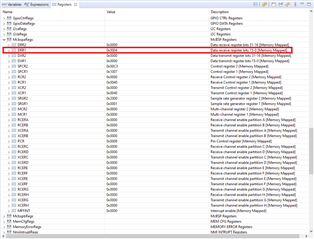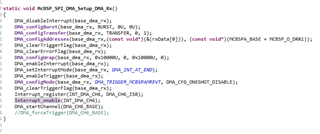Other Parts Discussed in Thread: TMS320F28386D, C2000WARE
Hello,
I am trying to use TMS320F28377S MCBSP A port as an SPI slave and use DMA CH6 to receive data. Is DMA supported for MCBSP SPI slave on the TMS320F28377S? I notice the MCBSP register DRR1 does get the first 16-bit word in a transfer from the master but it seems like the DMA controller is not moving the data. I am using 16-bit words for data transfer. If I use a transfer size of 1 and burst size of 1 I will get a DMA interrupt but the data isn't read from DRR1.
Other key points
- I'm able to send and receive data on the TMS320F28377S over the MCBSP A SPI port as a slave using interrupts without DMA. This works fine.
- I am able to use the TMS320F28386D MCBSP B port as a SPI master with tx/rx DMA transfers. It works fine.
void main(void)
{
//
// Initialize device clock and peripherals
//
Device_init();
GPIO_Setup();
//
// Initialize PIE and clear PIE registers. Disables CPU interrupts.
//
Interrupt_initModule();
//
// Initialize the PIE vector table with pointers to the shell Interrupt
// Service Routines (ISR).
//
Interrupt_initVectorTable();
McBSP_SPI_DMA_Setup();
IER = 0x60;
//
// Enable Global Interrupt (INTM) and realtime interrupt (DBGM)
//
EINT;
ERTM;
while(true)
{
//Loop forever
}
}
#include "driverlib.h"
#include "device.h"
#include <stdint.h>
#include <string.h>
#pragma DATA_SECTION(txData, "ramgs0"); // map the TX data to memory
#pragma DATA_SECTION(rxData, "ramgs0"); // map the RX data to memory
#define MCBSP_PING_PONG_SIZE 2
#define BURST 1
//#define TRANSFER 512
//#define TRANSFER 5 //For Testing to See 5 uint16_t on the scope
#define TRANSFER 1 //Transfer size of 1 causes an interrupt
volatile uint16_t txData[TRANSFER];
volatile uint16_t rxData[TRANSFER];
uint32_t base_mcbsp=MCBSPA_BASE;
uint32_t base_dma_tx=DMA_CH5_BASE;
uint32_t base_dma_rx=DMA_CH6_BASE;
//
// Define to select delay in clock cycles.
//
#define MCBSP_CYCLE_NOP0(n) __asm(" RPT #(" #n ") || NOP")
#define MCBSP_CYCLE_NOP(n) MCBSP_CYCLE_NOP0(n)
__interrupt void DMA_CH5_ISR();
__interrupt void DMA_CH6_ISR();
static void McBSP_SPI_DMA_Setup_McBSP()
{
//
// Reset FS generator, sample rate generator, transmitter, receiver.
//
McBSP_resetFrameSyncLogic(base_mcbsp);
McBSP_resetSampleRateGenerator(base_mcbsp);
McBSP_resetTransmitter(base_mcbsp);
McBSP_resetReceiver(base_mcbsp);
//
// Set Rx sign-extension and justification mode.
//
McBSP_setRxSignExtension(base_mcbsp, MCBSP_RIGHT_JUSTIFY_FILL_ZERO);
//
// Enable clock stop mode.
//
McBSP_setClockStopMode(base_mcbsp, MCBSP_CLOCK_SPI_MODE_NO_DELAY);
//
// Set Rx & Tx delay to 0 cycle.
//
McBSP_setRxDataDelayBits(base_mcbsp, MCBSP_DATA_DELAY_BIT_0);
McBSP_setTxDataDelayBits(base_mcbsp, MCBSP_DATA_DELAY_BIT_0);
//
// Set CLKX & FSX as inputs
//
McBSP_setTxClockSource(base_mcbsp, MCBSP_EXTERNAL_TX_CLOCK_SOURCE);
McBSP_setTxFrameSyncSource(base_mcbsp, MCBSP_TX_EXTERNAL_FRAME_SYNC_SOURCE);
//
// Set Tx and Rx clock and frame-sync polarity.
//
McBSP_setTxFrameSyncPolarity(base_mcbsp, MCBSP_TX_FRAME_SYNC_POLARITY_LOW);
McBSP_setTxClockPolarity(base_mcbsp, MCBSP_TX_POLARITY_RISING_EDGE);
McBSP_setRxClockPolarity(base_mcbsp, MCBSP_RX_POLARITY_FALLING_EDGE);
//
// Initialize McBSP data length.
//
McBSP_setRxDataSize(base_mcbsp, MCBSP_PHASE_ONE_FRAME, MCBSP_BITS_PER_WORD_16, 0);
McBSP_setTxDataSize(base_mcbsp, MCBSP_PHASE_ONE_FRAME, MCBSP_BITS_PER_WORD_16, 0);
//
// Set LSPCLK as input source for sample rate generator.
//
McBSP_setTxSRGClockSource(base_mcbsp, MCBSP_SRG_TX_CLOCK_SOURCE_LSPCLK);
//
// Set Divide down value for CLKG.
//
McBSP_setSRGDataClockDivider(base_mcbsp, 1);
//
// Enable Rx interrupt
//
//McBSP_enableRxInterrupt(base_mcbsp);
//McBSP_enableTxInterrupt(base);
//
// Set no external clock sync for CLKG.
//
McBSP_disableSRGSyncFSR(base_mcbsp);
//
// Wait for CPU cycles equivalent to 2 SRG cycles-init delay.
// Total cycles required = 2*(SYSCLK/LSPCLK). In this example
// LSPCLK = SYSCLK/4.
//
MCBSP_CYCLE_NOP(8);
//
// Enable Sample rate generator and wait for at least 2 CLKG clock cycles.
//
McBSP_enableSampleRateGenerator(base_mcbsp);
McBSP_enableFrameSyncLogic(base_mcbsp);
//
// Wait for CPU cycles equivalent to 2 CLKG cycles-init delay.
// Total cycles required = 2*(SYSCLK/(LSPCLK/(1+CLKGDV_VAL))). In this
// example LSPCLK = SYSCLK/4 and CLKGDV_VAL = 1.
//
MCBSP_CYCLE_NOP(16);
//
// Release Rx, Tx and frame-sync generator from reset.
//
McBSP_enableTransmitter(base_mcbsp);
McBSP_enableReceiver(base_mcbsp);
//
// Wait for CPU cycles equivalent to 2 SRG cycles-init delay.
// Total cycles required = 2*(SYSCLK/LSPCLK). In this example
// LSPCLK = SYSCLK/4.
//
MCBSP_CYCLE_NOP(8);
//Interrupt_register(INT_MCBSPA_RX, McBSP_SPI_Rx_Interrupt);
//Interrupt_enable(INT_MCBSPA_RX);
}
static void McBSP_SPI_DMA_Setup_DMA_Tx()
{
//
// Configure DMA Channel 1 (16 - bit datasize).
//
DMA_disableInterrupt(base_dma_tx);
//
// Configure 1 word per burst.
//
DMA_configBurst(base_dma_tx, BURST, 0U, 0U);
//
// Configure 127 bursts per transfer.
//
DMA_configTransfer(base_dma_tx, TRANSFER, 1, 0);
//
// Src start address = buffer & dest start address = MCBSPA DXR
//
DMA_configAddresses(base_dma_tx, (const void*)(base_mcbsp + MCBSP_O_DXR1), (const void*)(&(txData[0])));
//
// Clear peripheral interrupt event flag.
//
DMA_clearTriggerFlag(base_dma_tx);
//
// Clear sync error flag.
//
DMA_clearErrorFlag(base_dma_tx);
//
// Configure wrap size to maximum to avoid wrapping.
//
DMA_configWrap(base_dma_tx, 0x10000U, 0, 0x10000U, 0);
Interrupt_register(INT_DMA_CH5, DMA_CH5_ISR);
//
// Enable channel interrupt.
//
DMA_enableInterrupt(base_dma_tx);
//
// Interrupt at end of the transfer.
//
DMA_setInterruptMode(base_dma_tx, DMA_INT_AT_END);
//
// Enable selected peripheral trigger to start a DMA transfer on DMA
// channel 1.
//
DMA_enableTrigger(base_dma_tx);
//
// Configure DMA trigger source as McBSPA Tx EVT.
//
//DMA_configMode(base_dma_tx, DMA_TRIGGER_MCBSPAMXEVT, DMA_CFG_ONESHOT_ENABLE);
DMA_configMode(base_dma_tx, DMA_TRIGGER_MCBSPAMXEVT, DMA_CFG_ONESHOT_DISABLE);
//
// Clear any spurious Peripheral interrupts flags.
//
DMA_clearTriggerFlag(base_dma_tx);
//
// Enable interrupts in PIE block.
//
Interrupt_enable(INT_DMA_CH5);
}
static void McBSP_SPI_DMA_Setup_DMA_Rx()
{
//
// Configure DMA Channel 2 (16 - bit datasize).
//
DMA_disableInterrupt(base_dma_rx);
//
// Configure 1 word per burst.
//
DMA_configBurst(base_dma_rx, BURST, 0U, 0U);
//
// Configure 127 bursts per transfer.
//
DMA_configTransfer(base_dma_rx, TRANSFER, 0, 1);
//
// Dest start address = buffer & Src start address = MCBSPA DRR
//
DMA_configAddresses(base_dma_rx,(const void*)(&(rxData[0])), (const void*)(MCBSPA_BASE + MCBSP_O_DRR2));
//
// Clear peripheral interrupt event flag.
//
DMA_clearTriggerFlag(base_dma_rx);
//
// Clear sync error flag.
//
DMA_clearErrorFlag(base_dma_rx);
//
// Configure wrap size to maximum to avoid wrapping.
//
DMA_configWrap(base_dma_rx, 0x10000U, 0, 0x10000U, 0);
Interrupt_register(INT_DMA_CH6, DMA_CH6_ISR);
//
// Enable channel interrupt.
//
DMA_enableInterrupt(base_dma_rx);
//
// Interrupt at end of the transfer.
//
DMA_setInterruptMode(base_dma_rx, DMA_INT_AT_END);
//
// Enable selected peripheral trigger to start a DMA transfer on DMA
// channel 2.
//
DMA_enableTrigger(base_dma_rx);
//
// Configure DMA trigger source as McBSPA Tx EVT.
//
//DMA_configMode(base_dma_rx, DMA_TRIGGER_MCBSPAMREVT, 0);
DMA_configMode(base_dma_rx, DMA_TRIGGER_MCBSPAMREVT, DMA_CFG_ONESHOT_DISABLE);
//DMA_configMode(base_dma_rx, DMA_TRIGGER_MCBSPAMREVT, DMA_CFG_ONESHOT_ENABLE);
//DMA_configMode(base_dma_rx, DMA_TRIGGER_MCBSPAMREVT, DMA_CFG_CONTINUOUS_ENABLE);
//DMA_configMode(DMA_CH6_BASE, DMA_TRIGGER_SOFTWARE, DMA_CFG_ONESHOT_ENABLE);
//
// Clear any spurious Peripheral interrupts flags.
//
DMA_clearTriggerFlag(base_dma_rx);
//
// Enable interrupts in PIE block.
//
Interrupt_enable(INT_DMA_CH6);
}
void McBSP_SPI_DMA_Setup()
{
McBSP_SPI_DMA_Setup_McBSP();
McBSP_SPI_DMA_Setup_DMA_Rx();
McBSP_SPI_DMA_Setup_DMA_Tx();
txData[0]=1;
txData[1]=2;
txData[2]=3;
txData[3]=4;
txData[4]=5;
DMA_startChannel(base_dma_rx);
DMA_startChannel(base_dma_tx);
}
__interrupt void DMA_CH5_ISR()
{
//DMA_clearTriggerFlag(base_dma_tx);
//done=1;
DMA_stopChannel(base_dma_tx);
}
__interrupt void DMA_CH6_ISR()
{
volatile uint16_t rx_count=0;
volatile uint16_t r0, r1, r2, r3, r4;
rx_count=1;
r0=rxData[0];
r1=rxData[1];
r2=rxData[2];
r3=rxData[3];
r4=rxData[4];
DMA_stopChannel(base_dma_rx);
//
// Dest start address = buffer & Src start address = MCBSPA DRR
//
DMA_configAddresses(base_dma_rx,(const void*)(&(rxData[0])), (const void*)(base_mcbsp + MCBSP_O_DRR1));
DMA_startChannel(base_dma_rx);
DMA_clearTriggerFlag(base_dma_rx);
}






